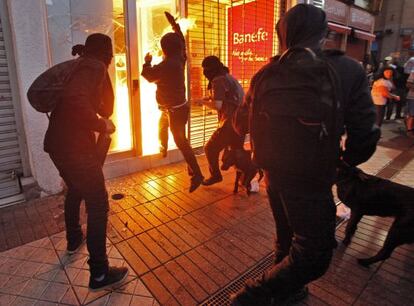Indigenous violence flares up in Chile after murders of landowners
Mapuche communities demand return of sacred ancestral lands in Araucanía

The murder of a married landowning couple earlier this month - victims of an arson attack in the town of Vilcún, 680 kilometers south of Santiago - has ignited widespread indigenous conflicts in the worst violence seen in the region in the past 100 years. The level of crime has also risen at unprecedented rates, and has prompted politicians to seek a national agreement to stop the ongoing dispute between the Mapuche Indians and farmers for control of land in Araucanía.
On Wednesday, Mapuche organizations opened a summit that is being held to discuss calls for a truce made by Interior Minister Andrés Chadwick, who led a government delegation to the IX region to meet with leaders and union representatives. Chadwick denied reports that the uprisings were being organized by leftist groups of foreigners out to destabilize the government of President Sebastián Piñera.
On January 4, masked men broke into Lumahue ranch house, which belonged to wealthy landowner Werner Luchsinger, 75, and his wife Vivian Mackay, 69. The elderly man confronted his attackers on the stairs. He reached for a firearm but was knocked unconscious by one of the attackers, according to a cousin of the victim. The woman was in the bedroom and tried to phone one of her four children and the police for help. But some minutes later, however, they both died from asphyxiation.
The assailants poured fuel around the building and set it on fire
According to a preliminary investigation, the assailants poured fuel around the building and set it on fire.
"This is an incomprehensible barbarity," said José Andrés Luchsinger, one of the children of the victims.
The Piñera government said that the two suspects so far in custody will be charged under a controversial provision in the 1984 Terrorism Act enacted during the Pinochet dictatorship, which sets high sentences for some homicides, kidnappings, arsons and bombings. "We will find them and we will not stop until we do," said Chadwick, the interior minister. Since that day, there have been five new attacks in the area.
But enforcing the Terrorism Act has ignited a fierce debate between Piñera's conservative government and the opposition, which also condemned the killings and itself used the law to prosecute cases of violence in Araucanía during President Michelle Bachelet's past administration. Nevertheless, the opposition leftist coalition considers it excessive to invoke it on this occasion.
"The government should be prudent and not fall into a frenzy of repression," said Socialist leader Osvaldo Andrade. The director of the National Human Rights Institute, Lorena Fries, argued that resorting to the Terrorism Act violates due process. "This is a time for political dialogue, not war." she said.
The Vilcún killings, however, have brought the political parties together, despite their differences, to seek a long-lasting solution to the Araucanía conflict, which no government has been able to resolve for the past 20 years.
The Indians want ancestral lands, water rights, autonomy and the protection of sacred sites
The double murder at the Lumahue ranch house coincided with the fifth anniversary of the death of Mapuche activist Matías Catrileo. Police found pamphlets at the old hacienda alluding to that incident.
Catrileo, a 23-year-old university student, died in 2008 while participating in the occupation of the Santa Margarita plantation, which is also owned by the Luchsinger family. Justice investigators ruled that a police officer, who was helping to dislodge the protestors, shot him in the back. According to the family of the dead young man, the police committed a "racist" crime.
Ongoing conflicts
There are 42 ongoing conflicts in the 1,798 Mapuche communities across the region. The Indians claim ancestral lands, water rights, autonomy and, among other things, the protection of sacred sites. Small radical groups have stepped up their violent campaigns in the past two decades to force the current owners of land to sell their properties to the state so that they can be returned to indigenous communities. Incidents, according to a report by the Santiago daily La Tercera, have increased by 76 percent in the Araucanía region between 2009 and 2012.
Working on vague clues, investigators have arrested two suspects in the Lumahue ranch case: Celestino Cordova Tránsito, 26, and his brother José, 30. The former is a Mapuche healer, who was found limping on the night of the murder at a nearby farm. According to police, Luchsinger had shot him before being struck down. The second man, according to prosecutors, was surprised at his home wearing clothes linking him to the Vilcún murders.
Mapuche community leaders have condemned the attack. "We all have a right to remember our loved ones, especially how Matías Catrileo died, but not by committing attacks where lives are at stake. As a leader, I reject it," said Luis Melinao, spokesman for the Wente Wilcún Mapu community.
Tu suscripción se está usando en otro dispositivo
¿Quieres añadir otro usuario a tu suscripción?
Si continúas leyendo en este dispositivo, no se podrá leer en el otro.
FlechaTu suscripción se está usando en otro dispositivo y solo puedes acceder a EL PAÍS desde un dispositivo a la vez.
Si quieres compartir tu cuenta, cambia tu suscripción a la modalidad Premium, así podrás añadir otro usuario. Cada uno accederá con su propia cuenta de email, lo que os permitirá personalizar vuestra experiencia en EL PAÍS.
¿Tienes una suscripción de empresa? Accede aquí para contratar más cuentas.
En el caso de no saber quién está usando tu cuenta, te recomendamos cambiar tu contraseña aquí.
Si decides continuar compartiendo tu cuenta, este mensaje se mostrará en tu dispositivo y en el de la otra persona que está usando tu cuenta de forma indefinida, afectando a tu experiencia de lectura. Puedes consultar aquí los términos y condiciones de la suscripción digital.









































